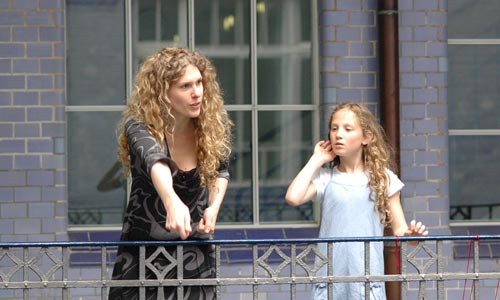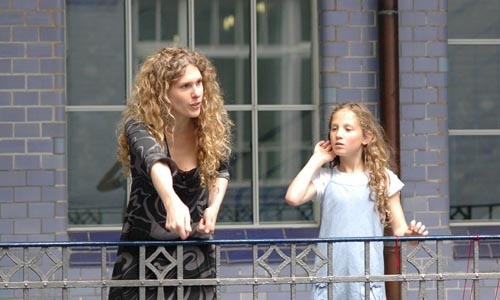Die Regisseurin Lotte de Beer über ihre Arbeit an der „Arabischen Prinzessin“ für die Oper Leipzig

Lotte de Beer ist eine der erfolgreichsten jungen Regisseurinnen unseres Nachbarlandes Niederlande. Peter Konwitschny begleitet den künstlerischen Weg der jungen Künstlerin. Am 20. Mai 2011 hat in der Oper Leipzig Arabische Prinzessin Premiere, ihre erste Arbeit auf der großen Bühne des Leipziger Opernhauses. Steffen Kühn traf Lotte de Beer am Rande der Probenarbeiten hier in Leipzig.
Steffen Kühn, Leipzig-Almanach: Lotte, schön Dich wieder in Leipzig erleben zu können, bei Deinem ersten Engagement „Clara S.“ im Kellertheater geisterte noch das Wort „Konwitschny-Schülerin“ durch den Äther. Würdest Du Dich so bezeichnen wollen?
Lotte de Beer: Yes. Konwitschny basically taught me everything I know. I learned the skills of directing by watching him, assisting him and eventually by doing a few of his revivals. And I learned even more from what he took the time for to teach me individually. Speaking about concepts, watching video’s of my own regies together and talking about art and life. Of course I am a different kind of director than he is. I do not want to be a copy of Konwitschny, but being called a Konwitschny-Schülerin is in fact quite an honor.
Kühn: Wie kam es zum zweiten Engagement an der Oper Leipzig?
De Beer: Of course one never knows how these things work. Why one is asked. All I know is that one day I received an e-mail from Franziska Severin asking me to direct the new childrensopera in 2011 on the big stage with soloists, 100 children from the Kinderchor of Oper Leipzig and the Gewandhausorchester. I can tell you I was very thrilled!
Kühn: Arabische Prinzessin – das Stück ist weitgehend unbekannt –, wie kam es dazu?
De Beer: It is a piece that was developed by the Barenboimstiftung. They wanted a childrens opera in which Arabic and Israeli children played together. They took existing music from Arriaga, a composer known as the Spanish Mozart (he died at age 19 and is therefore not very known) and wrote a bstory around is, based upon an Arabic fairytale. Paula Fünfeck wrote the texts for that.
Kühn: Was interessiert Dich an der Arbeit mit Kindern? Dein Engagement bei Hof Klang 2009, wo Du zu den Galgenliedern von Sofia Gubaidulina den Opernkinderchor in Szene gesetzt hast ist dem Leipziger Publikum ja noch in guter Erinnerung.
De Beer: Childern are natural actors. They have not yet learned to hide their natural sense of playing. Adult actors or singers have to find back that quality. Children can sometimes act without even knowing they are acting.
Kühn: Mich würden mal die Perspektiven einer niederländischen Künstlerin interessieren. Wie siehst Du den Kulturbetrieb in den Niederlanden und wie den in Deutschland, gibt es Unterschiede – und wenn ja, welche?
De Beer: In Germany the theatre is a natural part of people’s lives. You learn about authors, plays, opera’s in school and are taken to the theatre by your parents in all these Stadttheaters (or at least that is what we Dutch think) . In Holland there are very few people even knowing what something like opera even means. They have never been to an opera and don’t know what they could expect. When they do go, everything is strange for them. Classical singing, surtitles etc. all is new. When I’m in Germany it strikes me that when I tell people (in the train, in a taxi) what I do for a living, people can very often talk about what kind of theatre they like, what they have recently seen whereas in Holland I have to explain every time what that means, being a director if you’re not working for film or television. You should be very happy!
Kühn: Gerade in Amsterdam (an der Oper) wird ja viel Zeitgenössisches inszeniert – Rihm, Saariaho, van der Aa u.s.w., wie passt das zur eher rigiden politischen Situation, Herr Wilders ist, ja bekanntermaßen gegen jedwede künstlerische Ambivalenz, die Kulturausgaben sollen halbiert werden ab 2013, ist das richtig?
De Beer: That is going to be very, very difficult. In Germany (I was told) you spend about 4 percent on culture. In Holland we spend 0,75 percent. And that amount (under Wilders indeed) has to be cut down to half. The only thing a piece of art is going to be judged by (by politic) is whether it can make money. They absolutely dont understand that something as vaulnerable as art gets its value from being in a position where it doesn’t have to be profitable like everything else in our society. They are now saying that people like Shakespeare and Mozart didn’t get subsidised. Which is nonsense of course. In all times art was helped by kings, churches, aristocracy.
Of course I do think that it is our job as artists to make sure that people find their way to the theatres. Theatre without audience has no use what soever. The generation above me (at least in Holland) was always proud to ‚play away the audience from the halls‘. I find it the obligation of the next generation to find a way to get the audience back without artistically selling ourselves out. That way we take away the ground for art haters like Wilders. This is quite a challenge but the Dutch Opera has asked me to artistically lead a festival with 25 performances especially for new audience groups. Since in Holland 95 % of the population can be described as a new audience group, that is quite a job for me… It will play in the end of September 2011.
Kühn: Vielleicht hat die starke Rechte in den Niederlanden ja etwas mit der in der letzten Jahrzehnten gelebten Liberalität zu tun, Stichworte sind Homoehe, der freizügige Umgang mit leichten Drogen etc. Hat diese Freizügigkeit diese „Gegenbewegung“ gar provoziert?
De Beer: Probably. Especially since a part of society feels very left out in all this. There is a part of society who feels confident about change. Who feel they are citizens of the world who think change could be an opportunity. There is another part of society who is afraid of change, who wants things to stay the way they were. For a very long time politics didn’t listen to this group. Now they strike back. Left and Right are difficult terms in these times. The people who vote left are often better educated and make more money than the people voting (new- or extreme-) right. How to deal with this is something we ought to figure out very fast, otherwise I forsee a society I don’t want to live in anymore. Killing the art scene in Holland really feels like a revenge action of people feeling left out of this ‚elite left winged hobby‘ as Wilders describes art.
Kühn: Wie sehen Deine weiteren Pläne aus? In Amsterdam soll es im September ein Theaterfestival geben, welches Du kuratierst…
Kühn: 25 performances based on 25 titels from the past 25 years, both opera and ballet directed by young directors and choreografers as well as by big names such as Pierre Audi and hans van Maanen. And of course I will direct myself as well. The Ringlet (the Ring des Nibelungen in 1,5 hours for children) and Aida recomposed by the Turkish-German composer Sinem Altan. Further a flashmop of the National ballet at the Daqm square, opera in supermarkets, subways, a staged backstage tour etc etc.
Kühn: Ist wieder etwas in Leipzig geplant?
De Beer: I don’t think I can say anything about that yet, but I do plan on being here again soon.
Die arabische Prinzessin oder Das wiedergeschenkte Leben
Märchenoper in zwei Akten nach Musik von Juan Crisostómo de Arriaga
Inszenierung: Lotte de Beer
Premiere: 20. Mai 2011, Oper Leipzig



Kommentar hinterlassen